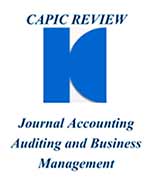Features of the curricular construction of accounting undergraduate programs in Chile
Published 2021-02-17
Keywords
- accounting,
- curriculum,
- curriculum design,
- higher education,
- profiles of graduates
How to Cite
Abstract
The study analyzes accounting undergraduate programs in the main characteris-tics of their design and construction of graduation profile. It also aims to identify the differentiating factors in the definition of the different denominations given to these programs in Chile. The research seeks to answer: What are the main characteristics of the training of the auditor accountant publicized by the Chilean universities? The research utilizes a qualitative method to contextualize and organize the publicly avail-able information systematically, introducing an ontological framework, which allows to entirely visualize the elements and components used in curricular design and con-struction, as well as to analyze the academic constructs implicit in the current aca-demic offer. The ontological framework conceptualizes the professional performance domains exhaustively, revealing the potential combinations that shape the graduation profile and curricular program in taxonomies. Study results show a heterogeneity and diversity in the abilities that the graduates are trained to perform. Regarding the prod-ucts that a graduate can supply to the labor market outstand the accounting services; while in the complementary areas, ethics is a major competence. In technical abilities, the capacity to advise, and the educational objective to create are important trends. Main domains for the education and training of the graduates are accounting, admin-istration and operations management, and auditing.
Downloads
References
- Armijos, J. y La Paz, A. (2019) Dificultades para la movilidad internacional del contador auditor. Revista Contabilidad y Sistemas, Vol 17, pp. 33- 44.
- Cancino V. y Schmal, R. (2014). Sistema de Acreditación Universitaria en Chile: ¿Cuánto hemos avanzado? Estudios Pedagógicos, Vol. XL, N° 1, pp. 41-60.
- CEDEFOP. (2012). Marcos de Cualificaciones en Europa: Un instrumento para la transparencia y el cambio. Nota Informativa. Octubre 2012. ISSN 1831-2446.
- CEDEFOP. (2017). Marcos de Cualificaciones en Europa. Evoluciones 2017. Nota Informativa. Febrero 2018. ISSN 1831-2446.
- CEDEFOP. (2018). Marcos de Cualificaciones en Europa. Evolución en 2018. Nota Informativa. Mayo 2019. ISSN 1831-2462.
- CINDA. (2017). Evaluación del logro de perfiles de egreso: experiencias universitarias. Centro Interuniversitario de Desarrollo. Grupo Operativo de Universidades Coordinadas por CINDA. Santiago de Chile.
- Coronado, F., La Paz, A., Ramaprasad, A., & Syn, T. (2015). Navigating the Complexity and Uncertainty of Higher Education Systems: Ontology Mapping of Chile’s Universities. Proceedings of HERDSA 2015, Melbourne, Australia.
- CRES (2018). La educación superior como parte del sistema educativo de América Latina y el Caribe. Calidad y aseguramiento de la calidad. Informe de la Universidad Nacional de Córdoba. ISBN: 978-980-7175-28-9.
- Federación Internacional de Contadores. (2008). Manual de los Pronunciamientos Internacionales de Formación. Recuperado el 17 de Noviembre de 2020, https://www.ifac.org/system/files/downloads/Spanish_Translation_Normas_Internacionales_de_Formacion_2008.pdf
- Hernández, A. (2006). La acreditación y certificación en las instituciones de educación superior. Hacia la conformación de circuitos académicos de calidad: ¿Exclusión o Integración? Revista del Centro de Investigación. Universidad La Salle, Distrito Federal, México. Vol. 7, núm. 26, julio-diciembre, pp. 51-61.
- International Accounting Education Standards Boards. (2015). Manual de Procedimientos Internacionales de Formación. Recuperado el 17 de Noviembre de 2020, https://www.ifac.org/system/files/publications/files/Manual-de-Pronunciamientos-Internacionales-de-Formacion-Edicion-2015.pdf
- La Paz, A., & Arrúa, K. (2019). Mapa de las Aspiraciones de la Educación Superior en Paraguay. Revista del CLAD Reforma y Democracia, 74 (Junio).
- La Paz, A., Merigó, J. M., Powell, P., Ramaprasad, A., & Syn, T. (2020). Twenty‐five years of the Information Systems Journal: A bibliometric and ontological overview. Information Systems Journal, 30(3), 431-457.
- López, R., (2016) Gestión estratégica de proyectos de desarrollo en sistemas de información: aplicación en la gestión universitaria. Tesis para optar al grado de Magíster en Control de Gestión, Universidad de Chile.
- López-Peña, A. (2017). Características de los procesos de Innovación Curricular en las Instituciones de Educación Superior de Chile. Tesis para optar al grado de Magíster en Educación con Mención en Currículo y Comunidad Educativa.
- Martínez, L. E. (2015). Evaluación del perfil de egreso: primer paso para la reformulación del curriculum. Revista de Investigación Educativa 21. Julio-Diciembre 2015.
- Martínez, J, Tobón, S. y Romero, A. (2017). Problemáticas relacionadas con la acreditación de la calidad de la educación superior en América Latina. Innovación Educativa, vol. 17, número 73. Pp. 79-96.
- Ministerio de educación de Colombia. (2017). Marco Nacional de Cualificaciones. Todos por un Nuevo País: Paz, Equidad, Educación. Bogotá, Colombia.
- Nuñez-Mondaca, A., Ramaprasad, A., & Syn, T. (2015). National Healthcare Policies in Chile: An Ontological Meta-Analysis. Medinfo. p. 1105.
- Ramaprasad, A. (2011). Envisioning a world-class university system for India. International Journal of Technology Management & Sustainable Development, 10(1), pp.45-54.
- Rodríguez, E. Gallegos, C. Palma, I. Rubilar, A. (2019). Competencias técnicas de costos en el perfil profesional del Contador Auditor Chileno. Revista Venezolana de Gerencia, vol. 24, núm. 86, 2019.
- Troncoso, K., y Hawes, G. (2007). Taller de construcción curricular. Acuerdos básicos sobre el perfil de egreso profesional (pp. 4). Santiago: Universidad de Chile, Vicerrectoría de Asuntos Académicos, Departamento de Pregrado.
- Vásquez, Jonathan, & La Paz, Ariel. (2019). The Knowledge Body of Requirement Engineering in IST Innovations: An Ontological Analysis. Journal of technology management & innovation, 14(4), 78-84.
- Wyman, Harold, E. (1990). El poder y la Importancia de la Contabilidad. Ayer, hoy y mañana; cómo fue, cómo es y cómo debería ser. Revista Española de Financiación y Contabilidad, Vol. XX, N°. 62, pp. 9-25.


































